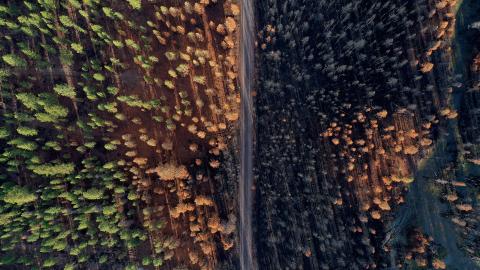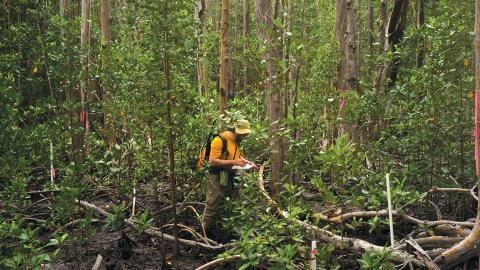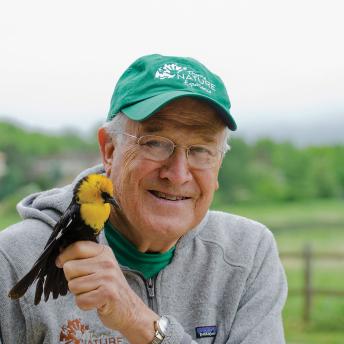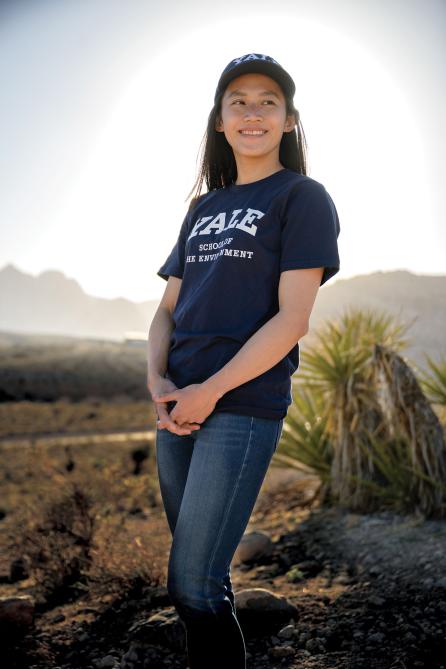
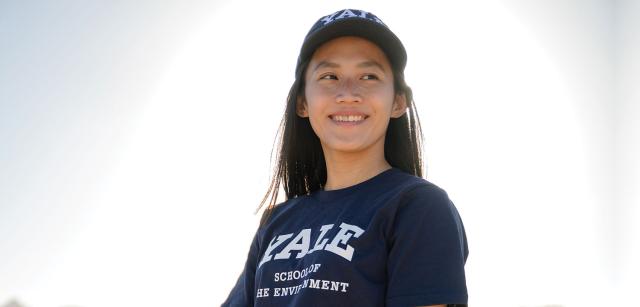
Wan Ping Chua at Red Rock Canyon National Conservation Area in Las Vegas, Nevada
The Life(cycle) and Times of a YSE T-Shirt
When it came time to design and source more sustainable school swag for YSE and The Forest School, Wan Ping Chua ’21 MEM and Leah Wise ’22 DIV had a perfect combination of skills and experience to undertake research based on a life cycle assessment approach (LCA).
Wan Ping Chua ’21 MEM and Leah Wise ’22 DIV may have grown up halfway around the world from each other, but their respective skills and experience complemented each other perfectly when a shared commitment to sustainability brought them together to work on the Yale School of the Environment sustainable swag project.

For the project, Chua and Wise spent several months working under the direction of Sara Smiley Smith ’07 MESc, ’07 MPH, ’16 PhD, associate dean of academic affairs, research, and sustainability, researching the design and sourcing of new apparel items — the first new swag items produced since the name change to the Yale School of the Environment (from Yale School of Forestry & Environmental Studies) and the establishment of The Forest School — to ensure they met high standards of sustainability.
Growing up in Singapore, Chua developed an early interest in sustainability when she attended the country’s first liberal arts college and took her first environmental studies class.
“It focused on systems thinking, wicked problems, and the imbalance of power, which is the backbone of many of the environmental problems we see today,” Chua says. “The class cemented for me, personally, that there was no other problem more urgent in the world.”
To help source sustainable and ethically produced merchandise, Chua and Wise undertook research using a life cycle assessment approach, which evaluates potential environmental impacts throughout the entire life cycle of a product (production, distribution, use, and end-of-life phases) or service. They considered agricultural practices, textile production, labor ethics and compliance, responsible dye and printing practices, biodegradability, shipping and transport, and consumer use.
Although Chua’s first exposure to life cycle assessment (LCA) was in a class taught by Yuan Yao, YSE assistant professor of industrial ecology and sustainable systems, which she describes as “fantastic,” Chua says part of what made their research approach unique was Wise’s real-world experience with apparel and consumer choices.
“Leah brought with her a lot of on-the-ground experience, which is not necessarily reflected in LCA databases,” she says. “In that sense, LCA was more of a guiding framework for us, and we were able to combine those real experiences to make the analysis richer.”
New sustainable YSE and Forest School apparel can be purchased online through Campus Customs .
Wise, who most recently managed a thrift shop in Charlottesville, Virginia, has been thinking seriously about fashion and consumer choices in the “real world” since she worked at a national retail chain more than a decade ago. “I noticed that some of the merchandise was listed as handmade by artisans, and I began to wonder what it meant for a $2 item to be handmade by someone on the other side of the world,” says Wise. “It inspired me to do a deep dive into the ethics of manufacturing.”
Wise’s “deep dive” also inspired her to start StyleWise, an ethical fashion blog in which she offers information and shopping guides to help readers find more sustainable alternatives to popular brands. Wise’s experience with the complexity of weighing ethical and sustainable choices proved extremely valuable when researching the options for YSE apparel, as things weren’t always cut and dried.
“It wasn’t always clear whether a domestically produced non-organic T-shirt or a fair trade, organic T-shirt produced overseas was a better option. And then we needed to account for size inclusivity, price point, and consumer demand,” Wise says. “In working toward our sustainability goals, it became clear to me that every choice is a compromise, but that doesn’t mean it’s bad. We need dramatic change across the industry, and I hope that in sharing our process, we can show that the fashion industry already has the tools and resources to do better.”
As sustainability strategy director at TensorIoT, a technology solutions company based in southern California, Chua regularly puts what she learned into practice to help the company’s clients achieve their sustainability goals.
“We help clients measure hotspots in their company, as well as in their product's supply chain. Then we direct where they should focus to reduce environmental impact,” Chua says. “The work spans sectors from hospitality to manufacturing, and even includes service-based industries.”
